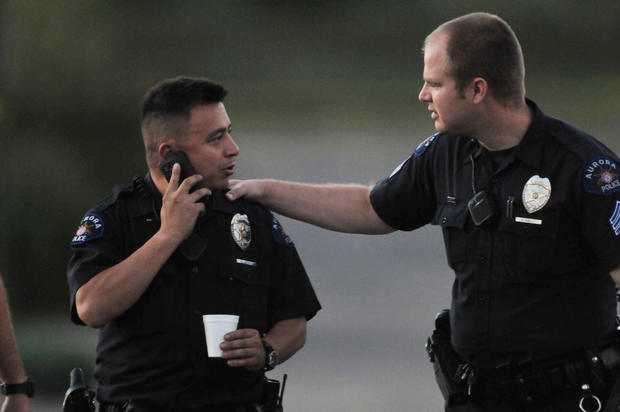Gun control debate returns after Colorado shooting
(CBS News) The national conversation about gun control has re-emerged following the deadly attack in an Aurora, Colo., movie theater overnight.
"Maybe it's time that the two people who want to be president of the United States stand up and tell us what they are going to do about it, because this is obviously a problem across the country," New York City Mayor Michael Bloomberg, a gun control advocate, saidearly Friday morning.
Bloomberg: Hold Obama, Romney accountable on guns
"The shooter should be brought to justice and prosecuted to the fullest extent of the law," Rep. Carolyn McCarthy of New York, a Democrat whose husband was killed in a mass shooting on a train, said Friday morning. "But we as a nation should also not continue to ignore avenues to prevent tragedies like this from happening in the future."
(Flags over the White House and U.S. Capitol lower to half-staff on Friday.)
Rep. Louie Gohmert of Texas, a Republican, said the story made him wonder, "With all those people in the theater, was there nobody that was carrying a gun that could have stopped this guy more quickly?" (Gohmert also tied the tragedy to the "ongoing attacks on Judeo-Christian beliefs.")
Online, meanwhile, debate was raging.
"A pre-emptive you should be ashamed of yourselves to any portion of the Federal government that doesn't at least try to have a conversation about guns after what happened today," wrote Daniel Gendler on Facebook. "Obama had a golden opportunity with Gabby Gifford[s], don't let this one slip away as well."
Giffords "horrified" by Colorado shooting
Jedediah Bila had this to say on Twitter: "Reminder to the gun control crowd: Guns don't kill people. People kill people. P.S.--Criminals & lunatics don't obey gun laws."
Both President Obama and Mitt Romney did not address gun control issues in their initial statements on the tragedy. In a press release Friday, the Brady Campaign to Prevent Gun Violence proclaimed, "We Don't Want Sympathy From The President Or Other Elected Officials; We Invite Americans To Join Our Campaign To Hold Politicians Accountable To Act."
Obama leads moment of silence for Aurora victims
Romney offers prayers, urges unity after Colorado shooting
Gun control advocates say there has been a distressing lack of action on their issue under the Obama administration.
"The president has not shown sufficient leadership on the gun issue," Dennis Henigan, vice president of the Brady Campaign, said in an interview. He noted that the president has not followed through on a campaign promise to try to reinstate an assault weapons ban and has not proposed any gun legislation in office.
Henigan said there have been signs, however, that Mr. Obama "has shown a willingness to stand up to the gun lobby" in recent years. He pointed to the president's Supreme Court appointments and an ATF regulation to combat gun trafficking to Mexico, both of which were opposed by the National Rifle Association. "He knew that by doing so he would incur their wrath, and he certainly has," said Henigan.
Mr. Obama was widely criticized for his comment in the 2008 campaign that some voters "cling to guns or religion," which is believed to have cost him votes in Southwest Pennsylvania and other areas of the country where guns are a fact of life.
(NYC Mayor Michael Bloomberg calls on Obama and Romney to get specific on gun control in a "Face the Nation" interview.)
Gun sales surgedafter Mr. Obama won office, out of an apparent fear that he would mandate stricter gun control laws. But no legislation has been passed to limit the availability of guns under the president, despite the 2011 shooting rampage in Tucson that killed six people and badly wounded Democratic Rep. Gabrielle Giffords. Indeed, the shift has largely been in the opposite direction, with states passing laws that allow guns and bars and Congress allowing loaded guns to be carried in national parks.
That's due in part to shifting public opinion: According to Gallup, the percentage of Americans who want gun laws to be stricter fell from 78 percent in 1990 to 62 percent in 1995. By 2007, it was down to 51 percent. And last year it was just 44 percent in Gallup polling. It's also tied to the strength of the NRA, one of the most powerful lobbying groups in Washington; lawmakers that defy the NRA know they are making a powerful enemy that could spend millions of dollars to defeat them.
Today's shooting tragedy in Colorado is likely to renew pressure on lawmakers to pass legislation to prevent attacks like this in the future. Yet recent history suggests serious gun control legislation as a result of the tragedy is unlikely: While the Columbine, Virginia Tech and Tuscon shootings prompted the now-familiar debates that have already begun in the wake of the Aurora attack, they did not lead to serious changes in gun control laws.
Henigan said he hoped this time would be different.
"We hope that the cumulative impact of these continuing tragedies will ultimately lead our politicians to begin to respond to the need for public safety, the need to stop this violence, instead of simply doing the bidding of the gun lobby," he said. "And this being an election year, I believe that the American people will say, as they say over and over again, 'enough is enough.'"
